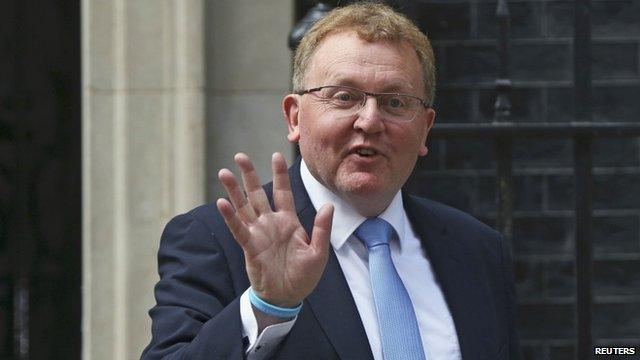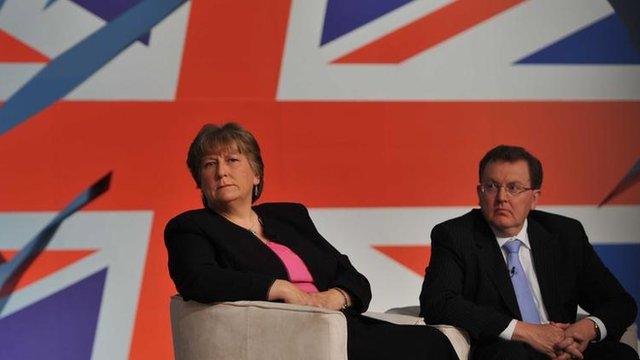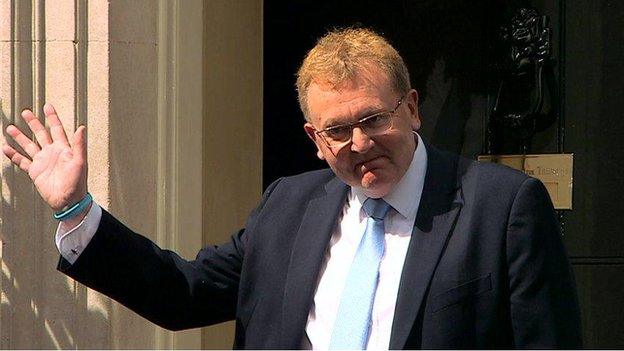Profile: David Mundell, Secretary of State for Scotland
- Published

David Mundell was given his new post by PM David Cameron
The Dumfriesshire, Clydesdale and Tweeddale MP David Mundell is a rare political breed given his position as the sole Scottish Conservative representative in the House of Commons.
And that rarity now comes with special status as the 52-year-old has joined David Cameron's Downing Street Cabinet as Secretary of State for Scotland.
The media focus is sure to increase on the former lawyer given the sharp focus on the UK's constitutional future.

Who is who in Cameron's Cabinet?

New Scottish Secretary of State for Scotland David Mundell will be sitting around the cabinet table alongside George Osborne; Theresa May; Philip Hammond and Iain Duncan Smith. But who else will be there?

Mr Mundell is a man who knows politics and his constituency well, having been born in Dumfries and schooled in Lockerbie.
His entrance into the political arena was typical of so many - he joined the Young Conservatives at the age of 14; went on to study law at Edinburgh University; after graduating he became a lawyer and was elected a local councillor.
However, that early journey was not with one party. His head was turned by the Social Democrats which he backed in the early 1980s.
Mr Mundell was elected an SDP councillor, serving on Dumfries and Galloway Council until 1987.
By 1999 he was back with the Tories and found himself part of the new intake of the new Scottish Parliament where he was the first MSP to ask a question.
He was returned to Holyrood in 2003, but in 2005 he set his sights on becoming an MP and stood for the Westminster seat of Dumfriesshire, Clydesdale and Tweedale.
Mr Mundell beat the Labour candidate by 1,739 votes, external and headed down to the House of Commons as the only Conservative MP in Scotland.
When Edinburgh Zoo welcomed two pandas from China a running joke began that there were more pandas in Scotland than there were Scottish Tory MPs.

What will the new Scottish Secretary for Scotland be facing?
By BBC Scotland Westminster correspondent David Porter
David Mundell will have to deliver new devolution for Scotland, which is backed by all the main parties
But he also has to be aware that he has many English colleagues who would like to see the power of Scottish MPs reduced.
He has the advantage that he knows the territory very well.
Essentially he has to decide with his Cabinet colleagues whether they go forward with the Smith Commission with more income tax powers for Scotland and more borrowing and welfare payments, or whether they go even further, as some people have said, and move to a more federal structure.
That is something the Cabinet will decide and that is something Mr Mundell will have to sell.

The first half of 2007 marked an uncomfortable period for Mr Mundell. It began with embarrassing headlines ahead of his party's Scottish conference in March when a Daily Record front page read: "Scots Tories are clueless - by Scotland's only Tory MP."
The story was based on a four-page memo written some nine months earlier, external in which Mr Mundell slammed the Holyrood Tory bench as having a "lack of thinkers".
It also contained a dig at the Scottish leader of the time, Annabel Goldie. Mr Mundell did not stop there and went on to call for the immediate replacement of the then Scottish Tory chairman Peter Duncan.

There are more pandas in Scotland than Scottish Tory MPs - so the joke goes
The public washing of dirty linen - just months ahead of the 2007 Holyrood election - prompted Conservative leader David Cameron to pay public tribute, external to both Ms Goldie and Mr Duncan.
He said: "Annabel has a no-nonsense approach and is addressing the issues that really matter in Scotland. The party in Scotland is in better health now than it has been for many years and is running an effective campaign."
There was a notable no mention for Shadow Scottish Secretary of State Mr Mundell.
The Holyrood election took place a few months after this episode and the party returned 17 members, external, one down on the previous electoral contest.
At Westminster, Mr Mundell - whose nickname is "Fluffy" - continued in his shadow Scottish secretary role.
And on taking to his feet in the House of Commons for the first Scottish Questions following the Holyrood poll, ironic cheers greeted him from the Labour government benches.
Leaked memo
BBC Scotland political editor Brian Taylor noted at the time: "MPs were, of course, indulging in a collective chortle over the leaked memo.
"Fluffy fought back, rather well in fact. He noted, acerbically, that at least he knew the names of his Scottish comrades."
That was a reference to the then health secretary Patricia Hewitt who had repeatedly called Scotland's Labour first minister between 2001 and 2007 Jack McDonnell instead of Jack McConnell.
In 2010, a coalition government between the Tories and the Lib Dems did not result in the top Scottish job going to Mr Mundell.

David Mundell criticised one-time Scottish Tory leader Annabel Goldie
Prime Minister Mr Cameron had to make concessions and one of those was picking a Scottish Lib Dem MP for the role of Secretary of State for Scotland.
First up was Michael Moore who saw through the arrangements for the Scottish independence referendum.
When he departed the scene, his Lib Dem colleague Alistair Carmichael saw through the independence referendum itself.
However, while the main job switched hands, Mr Mundell worked the full five years as undersecretary of state for Scotland.
This May's election result saw Mr Mundell being sent to Westminster for a third time (again as the sole Scots Tory MP), and finally the Scottish portfolio became his.
But what will the job of Scottish Secretary be like in 2015 and what challenges does Mr Mundell face?
The Union-supporting Conservatives were on the winning side when Scotland's electorate voted 55% to 45% against independence.
However, the "No" vote has not marked the end of constitutional politics as a new devolved settlement for Scotland is under way.
Human rights row
It is likely Mr Mundell will play a key role seeing that settlement through.
The Smith Commission recommendations have to be enacted and there are already political rows emerging.
On day one of his job, Mr Mundell said UK government plans to scrap the Human Rights Act would apply to Scotland.
That led the Scottish government to say it would "robustly oppose" withdrawal from the European Convention on Human Rights (ECHR).
The Scotland Act (1998) states that all legislation passed by Holyrood must be compatible with the ECHR, however, Mr Mundell told BBC Scotland new legislation would apply north of the border.
It is sure to be the case that during the next five years the words of rare political breed Mr Mundell will be listened to, scrutinised and criticised.
- Published11 May 2015
